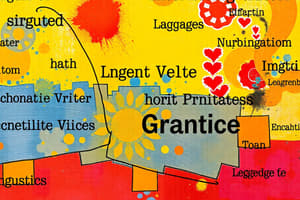Podcast
Questions and Answers
Which of the following best describes the concept of recursion in the context of language, as highlighted by Chomsky?
Which of the following best describes the concept of recursion in the context of language, as highlighted by Chomsky?
- The ability to produce an infinite number of novel sentences using a finite set of rules. (correct)
- The set of universal grammar principles shared across all languages.
- The capacity to understand a finite set of grammatical rules.
- The process of learning a language through repeated exposure to stimuli.
How does the Pirahã language challenge Noam Chomsky's theory of Universal Grammar?
How does the Pirahã language challenge Noam Chomsky's theory of Universal Grammar?
- Its grammatical structure is based on an entirely different cognitive process than other languages.
- It demonstrates a complex system of recursion, contrary to Chomsky's minimalist program.
- It lacks certain design features thought to be universal, such as recursion and embedding. (correct)
- The Pirahã's sophisticated color terms and numerical systems contradict universal linguistic principles.
In the context of language acquisition, what is meant by Chomsky's concept of the 'poverty of the stimulus'?
In the context of language acquisition, what is meant by Chomsky's concept of the 'poverty of the stimulus'?
- The linguistic environment provides insufficient data for children to fully acquire the complexities of language. (correct)
- Language acquisition is primarily driven by explicit instruction and correction from caregivers.
- Children acquire language solely based on imitation of adult speech, which is often incomplete and unstructured.
- Children are born with a fully formed grammar which is then refined through exposure to environmental stimuli.
What is the central focus of Ochs and Schieffelin's view on language acquisition and socialization?
What is the central focus of Ochs and Schieffelin's view on language acquisition and socialization?
Which of the following is a key aspect of anthropological fieldwork, contributing to the understanding of language and culture?
Which of the following is a key aspect of anthropological fieldwork, contributing to the understanding of language and culture?
Flashcards
Recursion
Recursion
The ability to embed phrases within phrases indefinitely, creating complex sentences.
Pirahã Language
Pirahã Language
A language spoken by an indigenous group in Brazil, noted for lacking certain linguistic features.
Language Socialization
Language Socialization
The processes by which individuals acquire language and learn to use it appropriately within their culture.
Poverty of Stimulus
Poverty of Stimulus
Signup and view all the flashcards
Culture (Anthropological)
Culture (Anthropological)
Signup and view all the flashcards
Study Notes
- There are several common misconceptions about language
- Primitive languages can express complex ideas
- Language change isn't inherently bad
- Written language isn't more perfect than spoken language
- The best languages do not necessarily survive
- Linguists do not fix grammar
Key Principles in Linguistics
- All spoken languages are equally complex
- All languages have rules
- Language change does not hinder communication
- Spoken language is prior to written language
- Linguists describe language, rather than prescribe rules
Defining Language
- Language represents a communication system that uses sounds and written symbols, used in specific regions
- Communication involves exchanging ideas using words, sounds, signs, or behaviors
Design Features (Hockett)
- Mode of Communication
- Broadcast transmission
- Rapid fading
- Interchangeability
- Complete feedback
- Specialization
- Semanticity
- Arbitrariness
- Discreteness
- Displacement
- Productivity/Creativity
- Duality of Patterning
- Cultural Transmission
- Prevarication
- Reflexiveness
- Learnability
Recursion (Chomsky)
- Recursion involves embedding one structure inside another of the same type
The Pirahã Debate
- The Pirahã are an Indigenous group in Brazil known for their unique language features
- The Pirahã language has no recursion
- The Pirahã have no counting system or grammatical number,
- The Pirahã have a limited vocabulary for time.
- Kinship terms are limited (2 generations above/below)
- The lack of recursion in Pirahã challenges Chomsky's idea of universal grammar
- Recursion, displacement, and tense are lacking in Pirahã
- The Pirahã language reflects cultural values, particularly an emphasis on present experience
- Gaps in language arise from cultural constraints
Stages in Language Socialization
- From 8-10 weeks babies make reflexive noises, crying
- At 6 months babies engage in vocal play
- From 6-12 months babies babble
- At 1 year babies enter the one-word stage
- At 2 years babies enter multi-word stage and know around 200 words
- At 5 years children use complex sentences, questions, and negative statements
Chomsky's View on Language Acquisition (Poverty of Stimulus)
- Innate Theory suggests that language ability is hardwired in humans
- Poverty of Stimulus refers to the fact that children acquire language despite limited or imperfect input
Brain Areas for Speech Production & Comprehension
- Broca's Area is responsible for speech production
- Wernicke's Area is responsible for speech comprehension
- The Auditory Cortex processes sounds
- The Motor Cortex controls muscle movement for speech
Ochs and Schieffelin's View on Language Acquisition
- In Kaluli child learns through broader social interactions
- In Samoan child learns in close-knit family units
- Social/cultural contexts play a bigger role than Chomsky's innate theories suggest
What is Culture?
- Anthropology: The study of humankind
- Linguistics: The study of language
- Linguistic Anthropology: The study of language and its social context
- Taylor's definition of culture: Culture is the complex whole including knowledge, beliefs, art, morals, law, and customs
- Metcalf's Definition of culture: Culture is learned through socialization
Anthropological Features of Culture
- Culture is learned
- Culture is shared
- Culture is symbolic
History of Anthropology and Linguistic Anthropology
- 19th Century "Armchair" Anthropology was based on second-hand accounts and emphasized classification and theorizing without direct fieldwork
- 20th Century Anthropology focused on empirical fieldwork
- Cultural Relativism is the belief that all cultures should be understood on their own terms
- Franz Boas founded modern anthropology and studied Indigenous cultures in North America
- Margaret Mead was famous for her work in Samoa
- Bronislaw Malinowski studied the Kula ring in the Trobriand Islands
Fieldwork in Anthropology and Linguistics
- Fieldwork is the direct, long-term research in a community
- Participant observation involves immersion in daily life to observe cultural practices
- Culture shock is disorientation when exposed to a new culture
- Informants/consultants are people from whom anthropologists gather data
- Fieldwork characteristics include long-term residence, language competence, and direct participation
Methodology
- Interview types: unstructured (informal), semi-structured (flexible questioning), and structured (fixed questions)
- Linguistic elicitation is when informants are asked specific questions about language
Studying That Suits You
Use AI to generate personalized quizzes and flashcards to suit your learning preferences.




